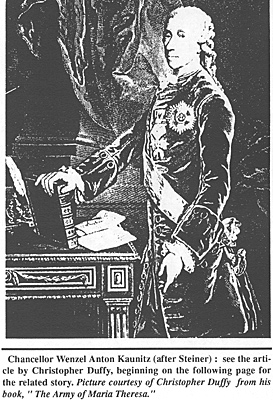 Editor: the following article is a paper that Professor Christopher Duffy delivered to an historical symposium in the Czech Republic during the latter half of 1994. Professor Duffy has graciously allowed us to reprint the paper in the SYWA Journal.
Editor: the following article is a paper that Professor Christopher Duffy delivered to an historical symposium in the Czech Republic during the latter half of 1994. Professor Duffy has graciously allowed us to reprint the paper in the SYWA Journal.
The Foundation of the Strategic Authority of Kaunitz
Franz Szabo's masterly study of the public life of Kaunitz (1) has established how the man widened the base of his power from the time he took charge of the Staatskanzlei (Foreign Office) in 1753 to the foundation in 1761 of the Staatsrath (Council of State), which was his creation and where he had the leading voice.
Most remarkable, in the military context, is the power which Kaunitz, a civilian, assumed in the management of strategy and military affairs. As he confided to one of the French military representatives, 'the confidence which the Empress has reposed in my loyalty and zeal has persuaded her to entrust me not only with determining the shape of military operations, but to make relevant projects and plans. I freely admit that a responsibility of this order would require rather more distinguished talents than mine, but I am not entirely new to this kind of thing, and I have followed several campaigns with close attention. (2)
Among the campaigns he had followed with particularly close attention were the unfortunate operations of the allied army in the Austrian Netherlands, where, as the 'Authorized Minister', he had witnessed the defeat at Fontenoy in 1745, and negotiated the surrender of Brussels in 1746. Speculation must be allowed a place in historical studies, and it is reasonable to suggest that these episodes impressed him with the military indefensibility of the Austrian Netherlands, and a perhaps exaggerated regard for the prowess of French arms.
Again, there is at least indirect evidence that Kaunitz reinforced his observations of military events with a serious study of military theory, and notably of the Marquis de Puysegur's Art de la Guerre par Principes et par Regles , Paris 1748 [3] Maria Theresa valued in Kaunitz (as she valued in Liechtenstein concerning the artillery, and Haugwitz on finances) the ability to put forward a rationale for action, and the will to pursue that action through to the end. Add to this the bureaucratic and presentational skills of Kaunitz, and his excellent everyday working relationship with Maria Theresa, and we have a man whose strategic authority was ultimately unchallengeable. Kaunitz himself rated the virtue of consistency very highly. When he proposed the establishment of a Staatratli he most artfully disclaimed any intention of instituting any kind of 'prime minister' as inconsonant 'with our form of government, and particularly during the glorious reign of Your Majesty, who gives so much of her personal attention to the conduct of business'. [4] However he might have been speaking of himself when he had written concerning the elder Pitt as 'not the kind of man who lives from day to day; on the contrary, he goes to work in a systematic manner, and has the gift of directing the decisions of the English government towards the attainment of a single objective.' [5]
Count Kaunitz Rietberg, Military Strategist: 1756-1763
Back to Seven Years War Asso. Journal Vol. VIII No. 1 Table of Contents
Back to Seven Years War Asso. Journal List of Issues
Back to Master Magazine List
© Copyright 1995 by James E. Purky
This article appears in MagWeb (Magazine Web) on the Internet World Wide Web.
Other articles from military history and related magazines are available at http://www.magweb.com